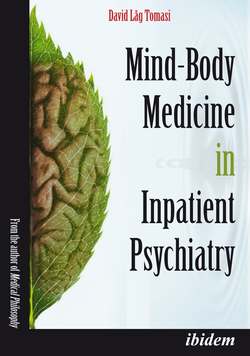Читать книгу Mind-Body Medicine in Inpatient Psychiatry - David Låg Tomasi - Страница 14
На сайте Литреса книга снята с продажи.
Chapter 1
Psychotherapy in Inpatient Psychiatry 1.1 General Aspects
ОглавлениеWhen discussing psychotherapy-based approaches in inpatient psychiatry, we will have to “go back to the basics” of the very concept of a form of therapy applied to the psyche. Of course, in the general sense, this form of therapy focuses on the wellbeing of the individual via multiple approaches to foster positive changes in the behavior and the thought patterns of the subject as in the case of cognitive behavioral therapy) as well as through ameliorate forms of personal and interpersonal interaction, coping and communication skills (as in dialectic behavioral therapy). Other areas which can be addressed in this setting are personal cravings, passions, compulsions, needs, thoughts, and beliefs, as well as conscious, subconscious, preconscious and unconscious elements at the basis of the aforementioned characteristics, especially in relation to theories of personality, emotion and sociocultural components, for instance in social cognitive theory. From the perspective of legislation, the State of Vermont provides this definition:
“(6) “Psychotherapy” means the provision of treatment, diagnosis, evaluation, or counseling services to individuals or groups, for a consideration, for the purpose of alleviating mental disorders. “Psychotherapy” involves the application of therapeutic techniques to understand unconscious or conscious motivation, resolve emotional, relationship, or attitudinal conflicts, or modify behavior, which interferes with effective emotional, social, or mental functioning. “Psychotherapy” follows a systematic procedure of psychotherapeutic intervention which takes place on a regular basis over a period of time, or, in the case of evaluation and brief psychotherapies, in a single or limited number of interventions. If a person is employed by or under contract with the Agency of Human Services, this definition does not apply to persons with less than a master’s degree, to persons providing life skills training or instruction, such as learning to make friends, to handle social situations, to do laundry, and to develop community awareness, or interactions of employees or contracted individuals with clients whose job description or contract specifications do not specifically mention “psychotherapy” as a job responsibility or duty. (Added (1987), No. 245 (Adj. Sess.), § 1; amended (1989), No. 250 (Adj. Sess.), § 4(b), (d); (1993), No. 98, § 8; (1993), No. 222 (Adj. Sess.), § 9; 1997, No. 40, § 50; 1997, No. 145 (Adj. Sess.), § 22; 2013, No. 96 (Adj. Sess.), § 177.)” (State of Vermont Board of Mental Health, 2017).
Psychotherapy thus involves evaluation, diagnosis, counseling, and treatment with a special focus on the relationship, rapport and dialogue with the patient. In this sense, psychotherapy is truly a form of “talk therapy” as separated (albeit not necessarily “opposed to”) psychiatry, which generally involves pharmacological interventions. In this sense, this discipline is truly at the center of both psychology (especially clinical psychology) and psychiatry. Although the clinical and legal rules and regulations, including training, supervision or internship vary significantly from country to country, the focus of psychotherapy is on helping the individual (in individual, private, one-to-one sessions) or the group (group psychotherapy) in various areas of his psycho-physical wellbeing via clinical application of theories, and methods from psychological science. Since the term combines ψυχή and θεραπεία, this discipline is an integral part of medical treatments based on medical-psychological science, neuroscience, theories and methods from behavioral medicine and positive psychology, and improvement strategies for patient-provider interaction and therapeutic alliance. As previously mentioned in the Introduction and in Chapter 1, the title and role of an inpatient psychiatry psychotherapist/group therapist has changed dramatically over the years. As this analysis is trying to illustrate, the changes occurred in the 5-year period 2012–2017 have been the most positive, with a dramatic amelioration following the modification to the implementation occurred in 2014, which, albeit for a short time, interrupted this positive trend. These were also some of the most productive years for the hospital as a whole, with the University of Vermont Medical Center (former Fletcher Allen Health Care) awarded U.S. News & World Report “Best Regional Hospital” for the 4th Consecutive Year in 2014–20151, and “Top ten” among university hospitals participating in the annual University HealthSystem Consortium (UHC) study, for providing safe patient care in 2013, and remaining in the top ranks until the end of 20152. In the Inpatient Psychiatry Unit, the professional figure of psychotherapist has changed in five main phases: 1. Recreational therapist, 2. Occupational therapist, 3. Activity therapist, 4. Group therapist, and 5. Psychotherapist. While each professional figures represent a well-defined area of clinical intervention in the therapeutic sense, the general direction of the changes of this figures moved from a more leisure-based, recovery and general well-being intervention, to a full clinical psychotherapeutic form of intervention which involved all the parameters listed above in the State of Vermont definition of psychotherapy. While this title was fully implemented (internally, by the hospital, as it was always a legislative requirement for all rostered practitioners) only in 2014, the full therapeutic and clinical-diagnostic evaluation characteristics of this profession were already in place in 2010–2012. More specifically, the clinical evaluation/psychological assessment of group therapists/psychotherapist since these years follows the structure below:
